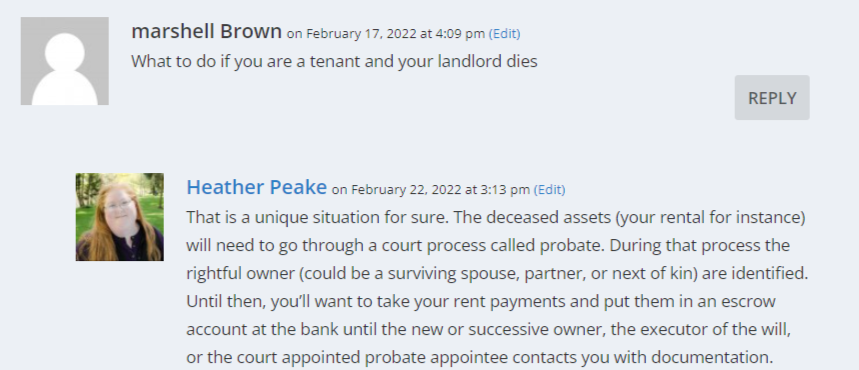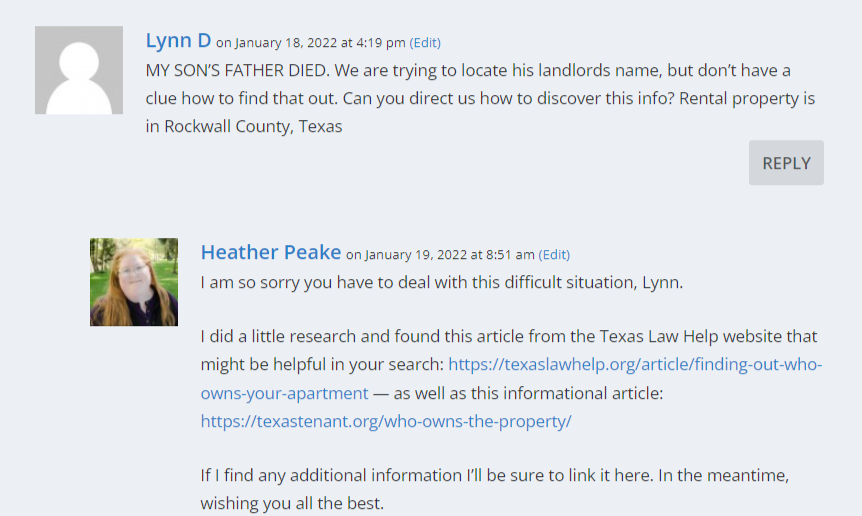
Can’t find your landlord? Interested in a property for investment? There are many reasons why someone would want to locate information to find out who owns a property and this article has all the tips to help you get started.
Why would someone want to find out who owns a property?
- Curiosity
- Legal reasons
- Debt collection
- Tenant concerns
- Emergencies
- Buyer/investor interest
You may be surprised to learn that the list is a long one but here are the most interested parties who look up property owner information:
- Renters
- Investors
- Property management companies
- Non-investor interested in the property
- Regulatory, governmental, or financial institution or agency
- Emergency services
- Neighbors
- Tax and bill collectors
- Utility Services
- Advertisers and marketers
Reasons why renters need to locate the property owner
Being in and around the rental industry for over a decade, I’ve run across a few reasons why a tenant may need to locate their landlord.
Help! My landlord died and I don’t know what to do next
Across the globe, on Quora.com, renters have asked the same or similar questions to what happens when their landlord dies. Check out those questions and answers here: Quora.com search results for ‘landlord dies‘. Overall, many of those answers are similar to the reply I offered on our Rentec Direct blog when a tenant asked:

What to do if you are a tenant and your landlord dies?
Answer: That is a unique situation for sure. The deceased assets (your rental for instance) will need to go through a court process called probate. During that process the rightful owner (could be a surviving spouse, partner, or next of kin) are identified. Until then, you’ll want to take your rent payments and put them in an escrow account at the bank until the new or successive owner, the executor of the will, or the court appointed probate appointee contacts you with documentation.
My rental sold and I don’t know who my new landlord is or how to pay rent
Sometimes the sale of a rental property comes as a shock to the renter if the property owner doesn’t go through the traditional listing process and sells off-market. Whether you knew this was coming or it came as a surprise, there are helpful tips below to help you know how to find out who owns a property and how to handle issues like paying rent.
I found out that I’ve been subletting and need to locate the actual landlord
It happens more often than we’d like to admit but between good intentioned renters needing out of their lease to actual scammers renting out properties not their own, you might find yourself in a sticky situation and need to find the property owner to sort out the situation.
My relative passed away and I need to locate their landlord
Dealing with grief and loss is difficult on its own without the added concerns of trying to locate a landlord regarding the housing agreement, security deposit, and belongings. If you find yourself in this situation, you can hop over the next section and go directly to How to Locate a Property Owner section below for help.

The landlord isn’t responding to my calls, emails, or texts
It could be that the landlord took a vacation without notifying you of who to contact in an emergency or something much worse. In most states, it’s required that property owners give renters emergency contact information and keep them informed if that information changes.
Before you face the possibility of an absentee landlord, if they haven’t proactively given you emergency contact information, be sure to ask for it at lease signing. You can also periodically confirm that the information is up-to-date.
Definition Corner
What is an absentee landlord?
An absentee landlord, also known as an absent landlord, is rental property owner that can not be located for a number of reasons such as:
- Might be seriously ill or have died
- Could be on vacation without an emergency backup
- The property sold or is in the process of selling
- A subletting situation
What to do when you can’t locate your landlord
These 5 steps below are your best guide to what you should do when you can’t locate your landlord.
Don’t stop paying rent! As a renter, your first responsibility is to pay rent in full and on time. If you don’t know if the landlord has passed away or has sold the property, it’s best to go to a bank and open an escrow account to deposit your rent into. Be sure you are making that deposit by or before your normal rent due date. You can also speak to a real estate attorney as they may be able to open and oversee an escrow account on your behalf.
Attempt to find what happened. Try to get a picture of your situation (died, injured, selling, sold, subletting). How you proceed might be different based on what you find out about your situation.
Gather rental documents such as your signed lease or rental agreement. If you have a signed lease or rental agreement, you can be assured that it must be honored by whomever owns the property as long as you have kept up your responsibilities outlined in the agreement. That’s why it’s vitally important to pay your rent in full and ontime.
Search for ownership status. Finding the owner is the fastest way to move forward with your rent payments, repairs and maintenance, lease renewals, or any other tenant concerns you have. You might be surprised in using the tips below to find out who really owns the property.
Pay rent owed that has been held in escrow to the (located or new) owner. Whether you created an escrow account at the bank or worked with an attorney, as soon as the owner is located it’s important to have the rent you’ve deposited transferred over to the owner.
How to locate a property owner
Have you ever asked, ‘who owns this house’ or ‘who owns this property’?
Investors can use the suggestions below to move forward on an off-market lead. Renters can use these suggestions to locate an absentee landlord. But, it’s not just investors and tenants who need to find out who owns this property in question. As we mentioned above, tax and bill collectors, utility companies and municipalities, and even emergency services might need to get ahold of a property owner. Below are some ways on how to find out who owns a property.
Property tax records and property deed
Head to your local tax assessor’s office or county clerk to search public records for notices of tax defaults or a history of the property. If they have an online database you’ll likely find a field such as ‘find property owner by address’. With the address and a fee, you might be able to locate the current owners.
Ask a real estate agent, bank, or foreclosure specialist
Those working in the real estate industry have insider knowledge and tools to be able to do some research for you. Real estate brokers and banks potentially will have information on off market sales and foreclosures.
Talk to a title company
A title search can bring up not only ownership but also interesting information like claims against the property title, debts, unpaid taxes, and other liens against the property.
Definition Corner
What is a title search?
A property title search (also called a deed search) is the process and research conducted by a title searcher of public records that produces a final resulting report which shows the chain of title (history of ownership) and includes any restrictions and claims against the property title such as:
Easements
Unpaid taxes
Unpaid HOA fees
Liens against the property
Partnership, corporation, or other stakeholder interest
Real Estate attorney
A real estate attorney can also perform a title search and might be the best in helping investors with purchasing agreements and renters with setting up an escrow bank account. Additionally, a lawyer might help act as a liaison when a property owner wishes to stay anonymous or ownership information is suppressed for reasons like witness protection.
Secretary of State
If you suspect, find by a title search on property, or otherwise find that the property is owned (outright or in part) by a corporation, partnership, or LLC, you’ll likely find access to property ownership if you contact the Secretary of State.
Apps and websites
In the old days, you could pull open the physical Whitepages or Yellowpages and look up addresses, businesses, names, phone numbers but today, it’s all wrapped up into a free tool online at 411.com
411.com could be a great jumping off point in your research. It offers the options to search by name, address, phone number, or company name. Using the reverse address lookup option, you’ll be given a result with all the persons or companies associated with that address. Note that it can bring up anyone associated with that address, past and present.
The big picture
It may take time (and maybe a fee or two) to get the information you’re looking for but with patience and a little help from the tips above, you’ll have figured out how to find out who owns a property and be on your way to connecting with the owner.





